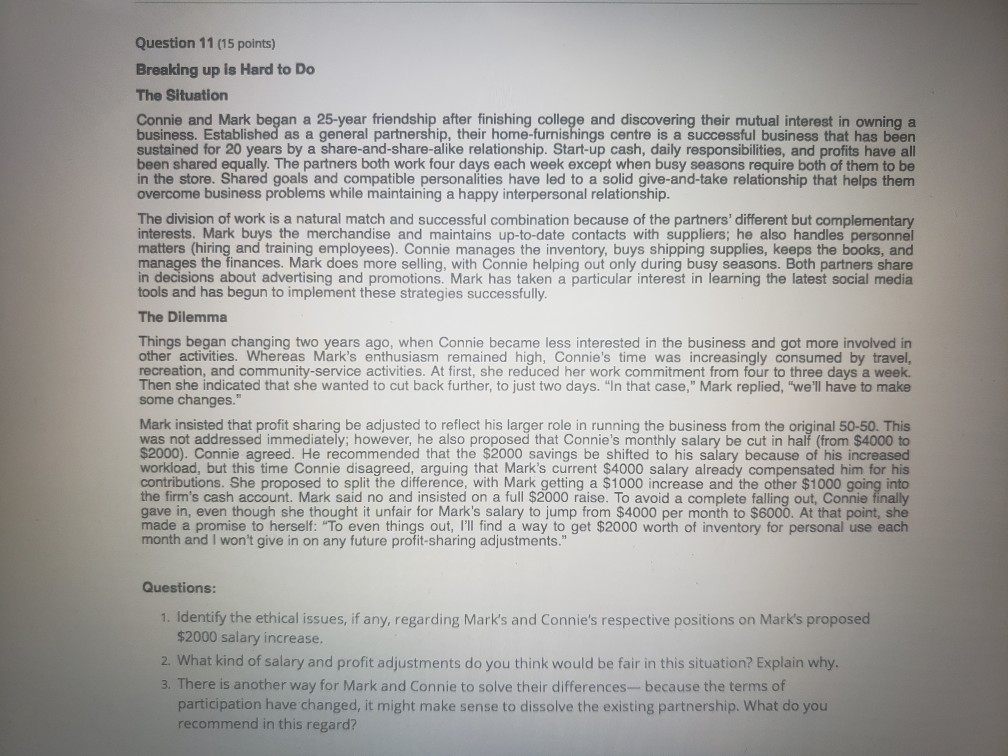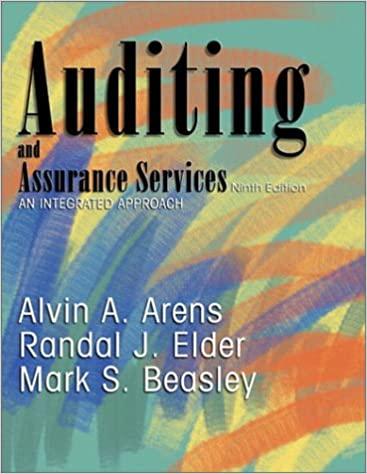Answered step by step
Verified Expert Solution
Question
1 Approved Answer
Question 11 (15 points) Breaking up is Hard to Do The Situation Connie and Mark began a 25-year friendship after finishing college and discovering their

Question 11 (15 points) Breaking up is Hard to Do The Situation Connie and Mark began a 25-year friendship after finishing college and discovering their mutual interest in owning a business. Established as a general partnership, their home-furnishings centre is a successful business that has been sustained for 20 years by a share-and-share-alike relationship. Start-up cash, daily responsibilities, and profits have all been shared equally. The partners both work four days each week except when busy seasons require both of them to be in the store. Shared goals and compatible personalities have led to a solid give-and-take relationship that helps them overcome business problems while maintaining a happy interpersonal relationship. The division of work is a natural match and successful combination because of the partners' different but complementary interests, Mark buys the merchandise and maintains up-to-date contacts with suppliers; he also handles personnel matters (hiring and training employees). Connie manages the inventory, buys shipping supplies, keeps the books, and manages the finances. Mark does more selling, with Connie helping out only during busy seasons. Both partners share in decisions about advertising and promotions. Mark has taken a particular interest in learning the latest social media tools and has begun to implement these strategies successfully. The Dilemma Things began changing two years ago, when Connie became less interested in the business and got more involved in other activities. Whereas Mark's enthusiasm remained high, Connie's time was increasingly consumed by travel, recreation, and community-service activities. At first, she reduced her work commitment from four to three days a week. Then she indicated that she wanted to cut back further, to just two days. "In that case," Mark replied, "we'll have to make some changes. Mark insisted that profit sharing be adjusted to reflect his larger role in running the business from the original 50-50. This was not addressed immediately; however, he also proposed that Connie's monthly salary be cut in half (from $4000 to $2000). Connie agreed. He recommended that the $2000 savings be shifted to his salary because of his increased workload, but this time Connie disagreed, arguing that Mark's current $4000 salary already compensated him for his contributions. She proposed to split the difference with Mark getting a $1000 increase and the other $1000 going into the firm's cash account. Mark said no and insisted on a full $2000 raise. To avoid a complete falling out, Connie finally gave in, even though she thought it unfair for Mark's salary to jump from $4000 per month to $6000. At that point, she made a promise to herself: "To even things out, I'll find a way to get $2000 worth of inventory for personal use each month and I won't give in on any future profit-sharing adjustments." Questions: 1. Identify the ethical issues, if any, regarding Mark's and Connie's respective positions on Mark's proposed $2000 salary increase. 2. What kind of salary and profit adjustments do you think would be fair in this situation? Explain why. 3. There is another way for Mark and Connie to solve their differences- because the terms of participation have changed, it might make sense to dissolve the existing partnership. What do you recommend in this regard
Step by Step Solution
There are 3 Steps involved in it
Step: 1

Get Instant Access to Expert-Tailored Solutions
See step-by-step solutions with expert insights and AI powered tools for academic success
Step: 2

Step: 3

Ace Your Homework with AI
Get the answers you need in no time with our AI-driven, step-by-step assistance
Get Started


